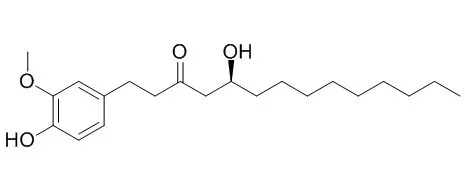| Kinase Assay: |
| In Vitro Cell Dev Biol Anim. 2015 Jan;51(1):92-101. | | 10-Gingerol induces mitochondrial apoptosis through activation of MAPK pathway in HCT116 human colon cancer cells.[Pubmed: 25148824] | The present study was designed to investigate the molecular mechanisms of 10-Gingerol activity against HCT116 human colon cancer cells.
METHODS AND RESULTS:
10-Gingerol inhibited the proliferation of HCT116 cells by 50% at a concentration of 30 μM, and this inhibition was dose-dependent accompanied by the morphological changes indicative of apoptosis. Furthermore, flow cytometric analysis showed that 10-Gingerol increased DNA in the sub-G1 phase of the cell cycle, and the extent of apoptosis was confirmed by Annexin V and PI double staining.
CONCLUSIONS:
Analysis of the mechanism of these events indicated that 10-Gingerol -treated cells exhibited an increased ratio of Bax/Bcl-2, resulting in the activation of caspase-9, caspase-3, and poly-ADP-ribose polymerase in a dose-dependent manner, which are hallmarks of apoptosis. Moreover, 10-Gingerol-induced apoptosis was accompanied by phosphorylation of the mitogen-activated protein kinase (MAPKs) family, c-Jun N-terminal kinase (JNK), p38 MAPK (p38), and extracellular signal-regulated kinase (ERK). | | Oncol Rep. 2016 Feb;35(2):779-84. | | 10-Gingerol inhibits proliferation and invasion of MDA-MB-231 breast cancer cells through suppression of Akt and p38MAPK activity.[Pubmed: 26554741 ] |
METHODS AND RESULTS:
In the present study, we investigated the roles and molecular mechanism of 10-Gingerol, a phenolic compound isolated from Zingiber officinale, in regulating cell proliferation and invasion of MDA‑MB‑231 breast cancer cells. 10-Gingerol treatment inhibited cell proliferation through downregulation of cell cycle regulatory proteins such as cyclin-dependent kinases and cyclins, and subsequent induction of G1 phase arrest. In addition, 10‑gingerol treatment blocked cell invasion in response to mitogenic stimulation. These antitumor activities of 10‑gingerol were mediated through inactivation of Akt and p38MAPK activity, and suppression of epidermal growth factor receptor expression.
CONCLUSIONS:
Collectively, these findings demonstrate the pharmacological roles of 10-Gingerol in regulating breast cancer cell growth and progression, and suggest further evaluation and development as a potential therapeutic agent for the prevention and treatment of breast cancer. |
|






 Cell. 2018 Jan 11;172(1-2):249-261.e12. doi: 10.1016/j.cell.2017.12.019.IF=36.216(2019)
Cell. 2018 Jan 11;172(1-2):249-261.e12. doi: 10.1016/j.cell.2017.12.019.IF=36.216(2019) Cell Metab. 2020 Mar 3;31(3):534-548.e5. doi: 10.1016/j.cmet.2020.01.002.IF=22.415(2019)
Cell Metab. 2020 Mar 3;31(3):534-548.e5. doi: 10.1016/j.cmet.2020.01.002.IF=22.415(2019) Mol Cell. 2017 Nov 16;68(4):673-685.e6. doi: 10.1016/j.molcel.2017.10.022.IF=14.548(2019)
Mol Cell. 2017 Nov 16;68(4):673-685.e6. doi: 10.1016/j.molcel.2017.10.022.IF=14.548(2019)